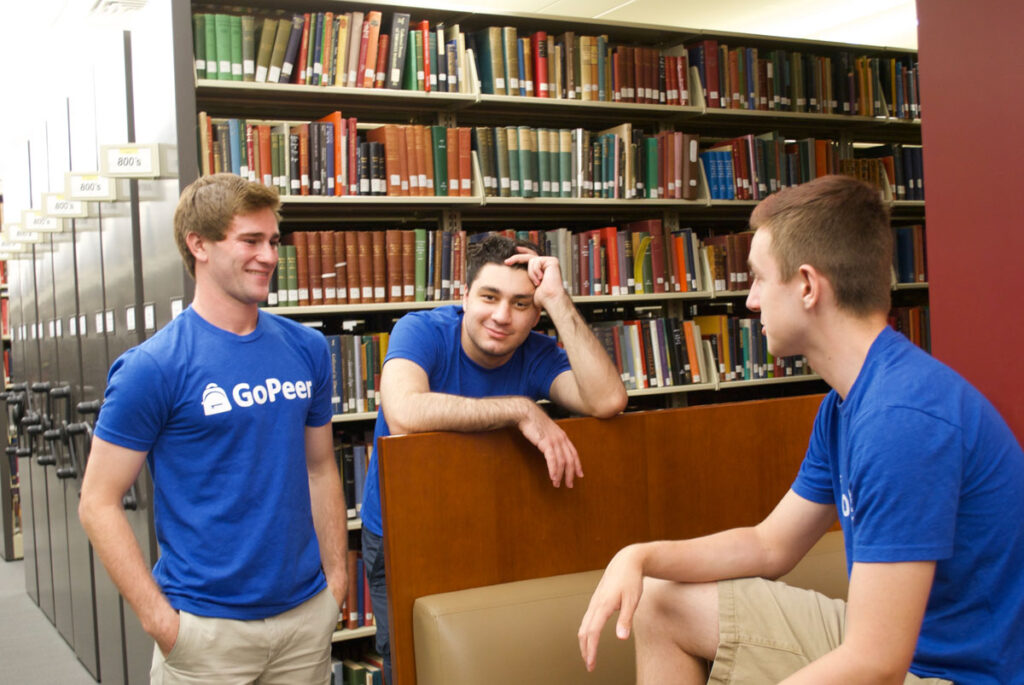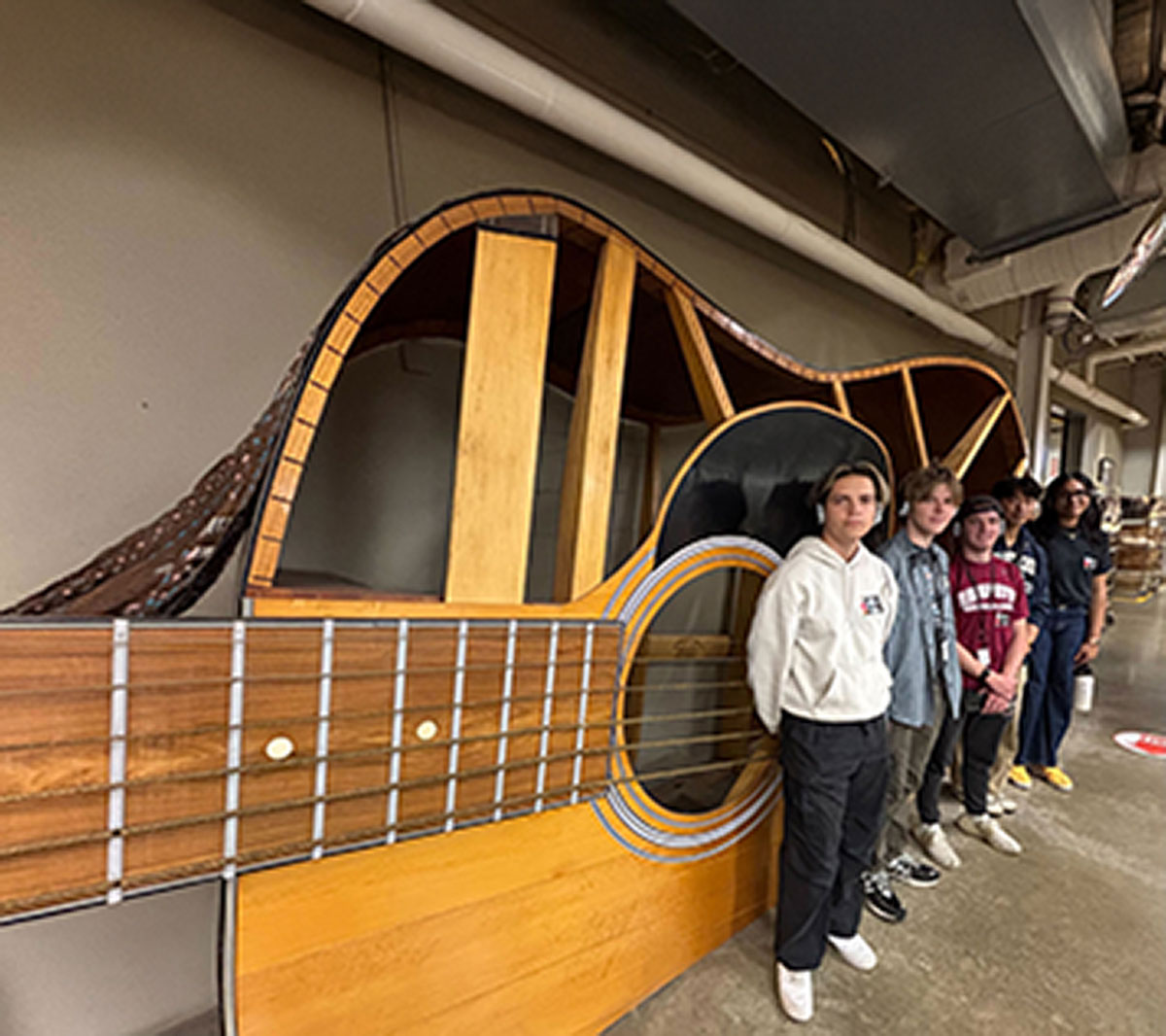
Illustrations by Nicolò Canova
Learning reimagined
In 2017, three Lafayette students launched their company, GoPeer, while in college. Now they are aiming to revolutionize the learning industry.
By George Spencer
The way Erik Laucks ’20 remembers it, in early 2017, a student was approaching programmers on campus with an idea for a company. He was even asking first-year computer science majors, like Laucks and Zura Mestiashvili ’20, if they would like to help him build a website.
Laucks and Mestiashvili weren’t initially convinced about the pitch from economics major Ethan Binder ’19. “Everyone had a million-dollar app idea they thought was going to the moon,” he recalls. There was such a craze for all things internet-related that Laucks, from Lebanon, Pa., says he even received unsolicited pitches from parents of classmates.
Eventually they would reconsider the business idea. Binder, who came to Lafayette from Providence, R.I., was both persistent and passionate. “All students should have easy and affordable access to a college student,” he says, recalling a time when his younger brother struggled with high school math until a Brown University student took him under his wing. Not only did his brother’s math scores improve, but he also felt inspired, as if he were being mentored by a role model. Because, in the end, he was.
Binder saw the existing tutoring industry as dysfunctional, because many families in need, unfortunately, couldn’t afford the expensive fees. What’s more, he felt that college students could, and should, be earning more for their work. Finally, there was an issue with accessibility to the services. How, for example, could a college student majoring in math easily connect with a sixth grader who needed algebra help? There had to be a better way, thought Binder.
The entrepreneurs admired Apple’s clean design aesthetic and its easy-to-use functionality. “We needed to build a product that students, tutors, and parents would love and trust,” Binder says. “We had to take a complex problem and simplify it so it would be an incredible user experience.”
We had to take a complex problem and simplify it so it would be an incredible user experience.
That’s how the germ of the idea emerged for what would become his wildly successful online tutoring and test prep company called GoPeer. Founded at Lafayette, the business was nurtured by the Big Idea Pitch Competition and Bergh Startup Accelerator at the Dyer Center for Innovation and Entrepreneurship. In its first three years, the dormitory-based company raised $4.8 million.
After graduating from Lafayette, the founders continued to grow GoPeer and benefited undeniably—and unpredictably—from the online learning movement brought on by the pandemic. By 2020, when COVID-19 hit, they were all confident that GoPeer would be an ongoing profitable venture, as the pandemic only accelerated what they had been doing. “We saw huge, huge spikes in usage,” Binder says.
In 2022, Imagine Learning, one of the nation’s largest education technology companies, purchased it for an undisclosed sum. Prior to its sale, GoPeer had reached 16,000 students in 48 states in five years. Today, as a part of Imagine, it has the potential to help 15 million students in that company’s 38,000 K-12 school ecosystem.
“GoPeer is definitely the biggest success story to come out of the Dyer Center,” says its director, Rita Chesterton. “We are a connecting hub for students. We’re planting seeds for them to go out into the world and become entrepreneurs.”
One day, while sitting together in class, Laucks had asked Mestiashvili if a student with a business idea had approached him about some freelance work; they decided to meet Binder at Skillman Café and hear what he had to say.
They came away excited. “No one else’s pitches had much substance,” Laucks says. “Ethan came very prepared. That was the big difference. Other people were throwing ideas at the wall.” Binder didn’t just have a notion for a business. He was so convinced he was onto something special he had already crafted a 20-page business plan. He had even sketched out what the website would look like down to where every button would be located, something that also impressed Laucks and Mestiashvili. “Ethan combined that passion with a humble approach,” says Mike Summers, associate vice president of Lafayette’s Gateway Career Center. “That made people want to help him.”
Over Starbucks coffee in the library common room, the chemistry felt good as they looked out onto the Quad. “I thought he was a really nice person—and driven,” recalls Mestiashvili, who grew up in Tbilisi, capital of the Eastern European nation of Georgia. Later, after playing pingpong in the Allan P. Kirby Sports Center, they sensed the potential in working together. They played hard. They played fair. And all three understood the tutoring world needed some help.

Mestiashvili had been tutored in high school. He knew from experience how difficult it was to find someone good who was also within budget. He and Laucks had gigs at Lafayette’s tutoring center, now known as the Academic Resource Hub; they knew that college students would jump at the opportunity to make decent money by way of tutoring.
At first, the goal was to build a website. Nothing more. A few weeks of work. Neither Laucks nor Mestiashvili asked Binder how much he was going to pay them. Soon, it became clearer and clearer they were going to do more than coding. Together, they began building a business, not a one-off website, and in May 2017, they incorporated their venture. “I always believed it would take all of us to build something truly special,” Binder says. “I was excited about doing that with them. I couldn’t do it by myself. Erik and Zura couldn’t do it by themselves. We needed each other to turn this plan into something incredibly special that was going to make a dent in the world.”
The founders saw themselves as equals, something Binder insisted on, a principle that was supported by them evenly splitting its shares: Binder would be chief executive officer, Mestiashvili became chief technology officer, and Laucks was chief information officer.
Having two technical people and one business leader made sense. Ethan, for example, excels at talking to people and presenting ideas and big pictures. “Zura is an incredibly gifted programmer and engineer,” Laucks says. “We have different specialties in tech and engineering that let us bounce off each other a lot.”
While Laucks and Mestiashvili burned the late-night oil and slammed out millions of lines of code, Binder did all things non-engineering that involved product growth and operations. He hit the road to New England, having won entry to the 2018 and 2019 MassChallenge Accelerator, an elite program that seeks to match company founders with financial backing.
“I probably pitched the company to 300 to 400 investors,” Binder says. When he wasn’t trying to win over well-heeled, gimlet-eyed investors, he did grunt work. He posted flyers on Boston campuses to recruit tutors. He visited public schools and gave administrators “free lesson” vouchers for students.
We saw an opportunity in line with our vision and mission to make high-quality learning accessible for all students.
During his junior and senior years, he made the five-hour Easton-Boston commute in his nearly 20-year-old black Volvo S60 at least once a week—often more frequently. Ever industrious, Binder had bought the sedan with money he had saved from summer jobs in high school. It already had 90,000 miles on it; these trips to Boston, plus other business-related travel for GoPeer, added another 100,000 miles. Binder used these hours in the car to his best advantage. He fired up business success audio books like Never Split the Difference, The Lean Startup, and Measure What Matters, along with several others.
Wayne Barz remembers Binder’s work ethic. As chief investment officer of Ben Franklin Technology Partners, he oversees a team that makes direct investments in high-tech startups from northeastern Pennsylvania. For a decade, he was also an adjunct professor at the College, where he taught a Monday and Wednesday night course on how to build a company.
“After class on Monday, Ethan would commute home to Rhode Island and work on the business in Boston. Then he’d come back on Wednesday. He did that for 14 weeks,” Barz says. “He’s a very earnest, quiet guy but passionate and driven. He was focused on being able to help low- and moderate-income kids. I don’t think he was in it to be a billionaire.”
Like Binder, Laucks also felt that there was more to GoPeer than the bottom line. “Some people get into starting a company purely trying to make a bunch of money. I’m not discounting that,” he says, but for him the desire to crush problems and do good work ruled the day. Although there was never a time when something felt unsolvable, says Laucks, there were difficult times when they needed some direction or money for, say, staffing or marketing. “What energized me to find solutions to those problems was how much I believed in what we were building,” he says.
When times got tough, Binder was resilient. He referred to something venture capitalist Paul Graham once said about how to survive as a startup: Be like a “cockroach,” because if you can operate as lean as possible, and be willing to face any challenge, you’ll never die. And that was what they did—even despite additional hurdles of juggling classes and, in Binder’s case, playing varsity tennis. “We did whatever we could to move forward,” he says. Despite the pressures of launching a business in college, the entrepreneurs say that being in the ed-tech sector redoubled their commitment to their schoolwork.
They built a digital classroom—think Zoom, but with a digital whiteboard, says Binder—with a code editor, a note editor, and a tutor-student matching system within the platform. “We had to be able to pair college students with K-12 students at scale,” says Binder. “We are not just a tutoring company. We built the engine to power tutoring and to allow college students to run their own businesses.”
In different ways, Binder and Laucks spread the GoPeer message on campus. Binder habitually wore a blue T-shirt emblazoned with the GoPeer logo. (“I wore it so much that the print started to wear off,” he says.)
Meanwhile, Laucks set up shop in his “office,” a cozy chair by the newspaper office in the back of Farinon. To help him focus and avoid small talk, he rarely took off his Sony headphones. “I coded day in and day out until public safety would come to close the building at two in the morning and kick me out,” he says, explaining sometimes he would clock 12-hour shifts of working on the website. “People called it my ‘office.’ Some administrators asked me if I was going to take the chair with me when I graduated.”
Spring 2018 marked a turning point. GoPeer participated in the Dyer Center’s Big Idea Competition in which students pitch business ideas to judges from local alumni and business communities. They placed second. “We recognized their hustle,” says Jolene Cardassi, Dyer’s marketing coordinator. “We were confident they would make significant progress.” Building on that recognition, GoPeer then earned a spot in the Bergh Startup Accelerator program. Each member received a $5,000 stipend and could live on campus so they could focus 100 percent on their business.
It wasn’t long before the company took off. In GoPeer’s first four years, its revenues grew 200 to 600 percent year over year. But there were times they had to adapt. “We had to reshape, remodel, and pivot the company to a more sustainable online learning model,” Laucks says. Now, with a monthly subscription to GoPeer, parents can hire talented tutors for $20 an hour and college students can rely on a steady source of kids to teach.
To accommodate growth, they opened a Boston office and employed 15 staffers. Then, in 2022, Scottsdale, Ariz.-based Imagine Learning came along. “We saw an opportunity in line with our vision and mission to make high-quality learning accessible for all students. We had helped 16,000 students, but Imagine had access to 15 million students. It had the distribution GoPeer didn’t have,” Binder says. This year, the Pards landed on the Forbes “30 Under 30” list for their contributions to education—with, it seems, far bigger impact ahead.
“It’s unusual for entrepreneurs to find their idea while still in college,” Chesterton says. “Nobody judges Dyer’s success on the number of students who graduate with successful ventures. It’s based on how we move the needle in making our students more entrepreneurial. If you have this entrepreneurial mindset, you can go much further in your career.” Binder notes that had he not attended Lafayette, he might not have ever embarked on this journey. “Lafayette offered a unique environment that allowed me to excel academically while also delving into entrepreneurship,” he says. “That has significantly shaped my life.”




